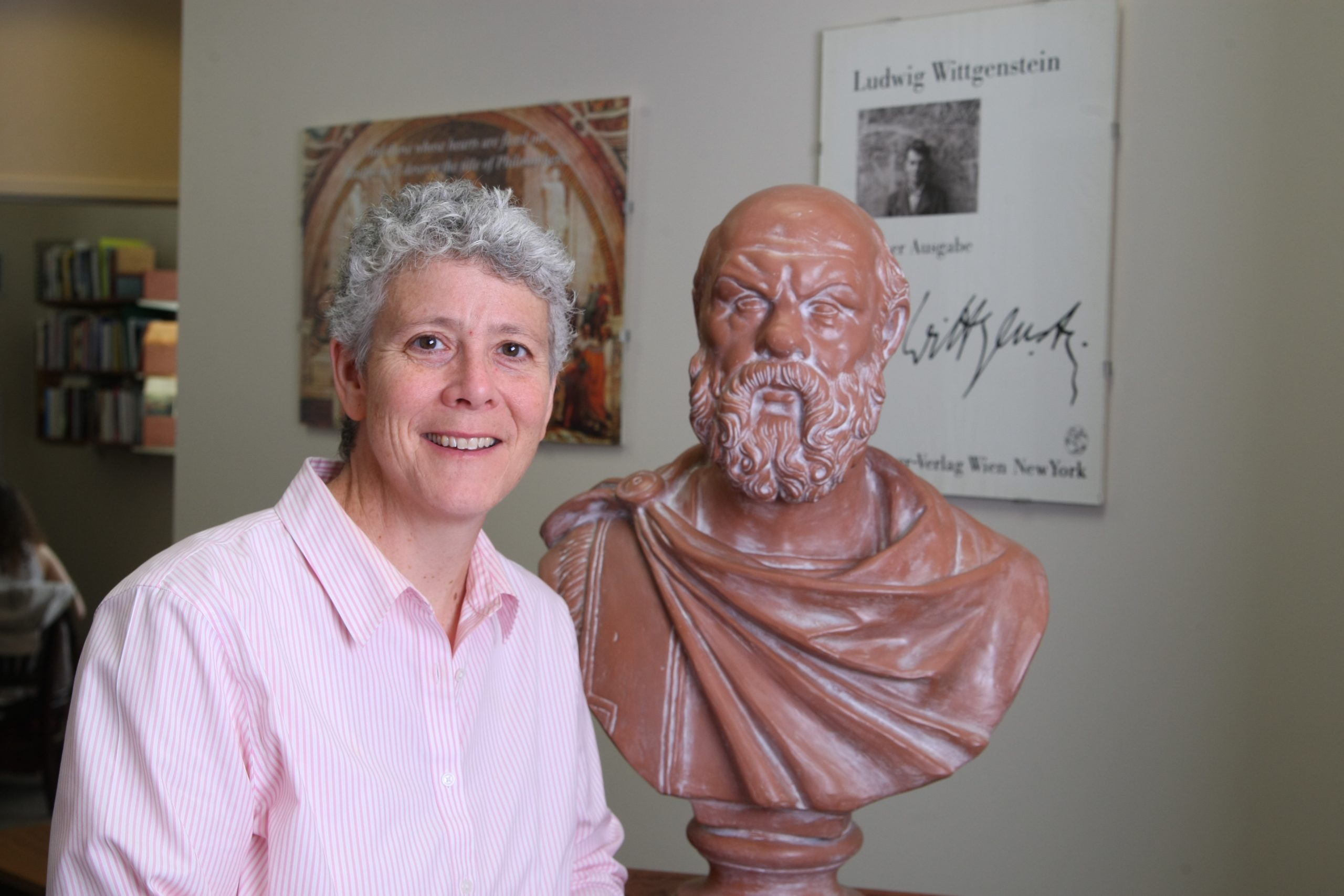Gustavus Adolphus College philosophy and gender, women, and sexuality studies professor Dr. Peg O’Connor’s philosophy of addiction blog on Psychology Today has surpassed more than one million total hits.
In her blog posts, O’Connor combines her expertise in philosophy and her commitment to expanding the conversation on addiction to write “Philosophy Stirred, Not Shaken.” The content explores a philosophical and feminist approach to the topic of addiction, offering short pieces on a variety of topics to a wide audience of readers.
“People are constantly looking for ways to understand themselves, the people they love, or the people they work with, but they aren’t always looking for a scientific answer. With the rates of addiction increasing at a steady incline, the popularity of this blog reaffirms the value of philosophy in practices of self-examination and self-care,” O’Connor said. “Addiction is called a disease of the brain. But a person is much more than just a brain. Philosophy helps touch the ‘why’ of addiction that is so often missed in scientific conversations.”

In the classroom, O’Connor shares her interests with students, teaching a seminar course on the Philosophy of Addiction as a capstone in the philosophy major. She also serves on the Chemical Health Task Force at Gustavus, engaging students in discussions about the drinking culture on college campuses.
“At a liberal arts school, I can focus on both my research and my work with students from all disciplines,” O’Connor said. “As a professor, I find myself in the incredible spot of coming back to the same questions about life and meaning that I ran into as an undergrad, but this time with new information.”
The importance of O’Connor’s research on addiction and recovery was highlighted at the 51st Nobel Conference at Gustavus in 2015, “Addiction: Exploring the Science and Experience of an Equal Opportunity Condition.” Serving as the Conference chair, O’Connor brought together the field’s experts in medicine, neuroscience, sociology, economics, and philosophy to explore the science and experience of addiction.
“Not only were we able to expand the conversation surrounding addiction to a wider audience, but we also made it clear how much more work needs to be done to collectively understand it as a public health problem,” O’Connor said. “Since the event, I have had more opportunities to work with the speakers we hosted at the conference. It is incredible to be able to continue the conversation and let the Nobel Conference live on as these important ideas are debated and studied.”
In one such occasion, O’Connor collaborated with Dr. Owen Flanagan, the James B. Duke Professor of Philosophy and professor of neurobiology at Duke University and one of the 51st Nobel presenters, through the Rydell Professorship at Gustavus. Together, the two philosophers engaged Gustavus students with questions and discussion about ethics, meaning, and life.
O’Connor’s expertise stems from many years of research and publication. Finding an early connection in her studies to the philosopher Ludwig Wittgenstein, her research focuses around his influence of thought. In 2002, she published Oppression and Responsibility. In 2008, her second book about Wittgenstein and ethics, Morality and Our Complicated Form of Life, was released. O’Connor’s essays have also appeared in The New York Times and the Huffington Post.
More recently, O’Connor’s focus on the philosophy of addiction culminated in the publication of Life on the Rocks: Finding Meaning in Addiction and Recovery in 2016. The book is the first in this field to approach addiction and recovery with a western philosophy lens. Relating to the topics explored in her blog, O’Connor’s book is directed towards all audiences, regardless of philosophical background.
Looking forward, O’Connor will be delivering a lecture about her research at the Mayo Clinic School’s 4th annual Humanities in Medicine Symposium later this fall. Then, she will travel to the University of Michigan as an invited speaker to a Society for Philosophy and Psychology panel discussion about addiction and agency.
“The decision to hold a conference dedicated to the roles of ethics and humanity in medicine is an important one. I appreciate these two honors as great opportunities to keep philosophy in the discussion of addiction as much as I can,” said O’Connor.

Leave a Reply
You must be logged in to post a comment.